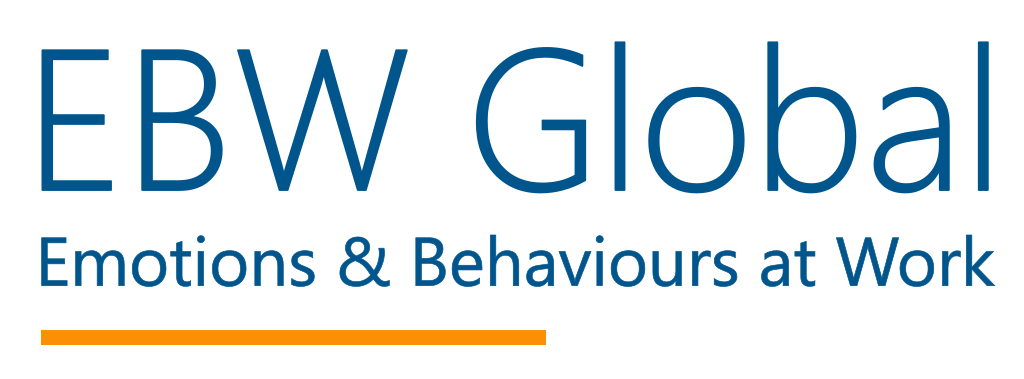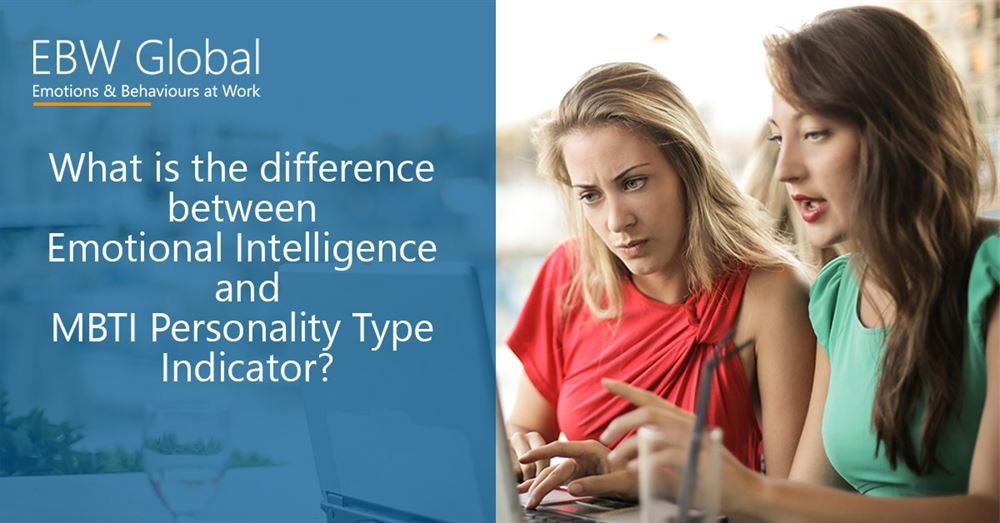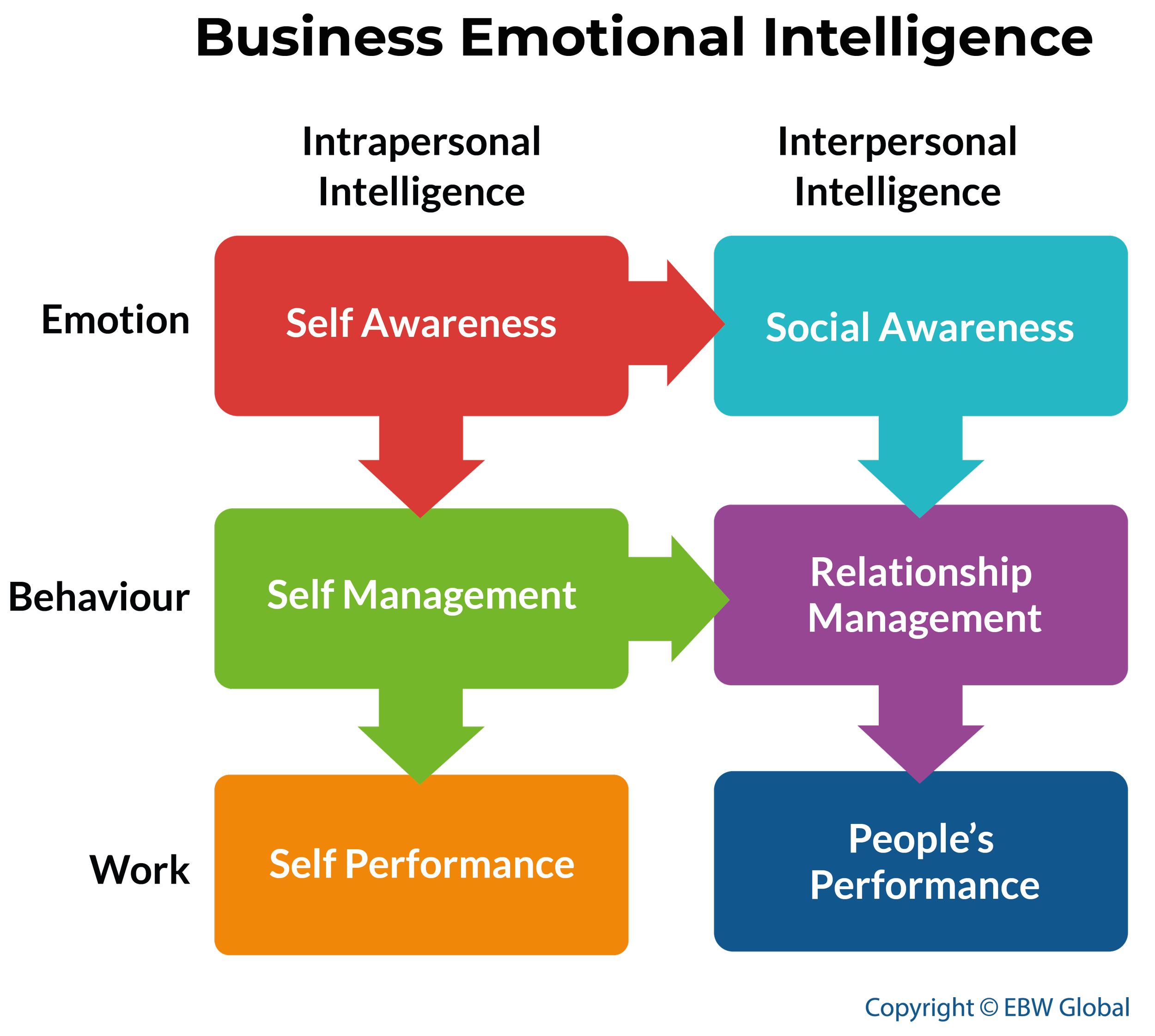Whats the difference between EBW and the MBTI
When we first introduce the EBW Emotional Intelligence assessment to leaders and teams, people often ask "Is the EBW like the MBTI?"
It seems like a reasonable question, as both the EBW and the MBTI are psychometric assessments that aim to provide insights into the way a person is likely to behave.
But although they both assess people; they are based on different psychology models (Emotional Intelligence and Personality) that explain why a person behaves the way he/she does.
The names are the first indications of their different approaches.
The EBW means Emotions and Behaviours at Work and its focus is on examining how Emotional Intelligence in the workplace drives performance.
It was created by a team of Occupational Psychologists (Dr Neil Scott et al) who specialise in the development of occupational assessments, diversity and equal opportunities.
The MBTI means Myers Briggs Type Indicator. It is based on Carl Jung’s theory of psychological types, which was based on his beliefs and observations, not substantiated science.
Over the years there has been a lot of criticisms of the MBTI, people tend to fall into two camps those that hate and those that love it (a bit like marmite). We not going to discuss its merits or its criticisms but focus on what the different models Emotional Intelligence and personality types tells us about people's behaviour.
The fundamental differences between the two approaches are;
The EBW Business Emotional Intelligence assessment was designed specifically for the selection and development of leaders/managers and staff in the workplace. It is normative measure, designed for a quick assessment of a person's ability to use their Emotional Intelligence at work and compares the User against different benchmarking groups (graduates, senior managers etc).
The MBTI was not explicitly designed for use in the workplace, it is a general personality psychometric (Ipsative measure) designed to provide insights into how a person perceives themselves in relationship to their personality type – e.g. I am more extrovert than I am introvert.
The MBTI was not designed for selection (they even say this on their website) and it should not be used for this purpose.
The EBW explicitly assesses emotional areas, such as ‘resilience’, ‘emotional control’, motivation and confidence. It also provides an indication of a person's self-awareness of their emotional behaviour and how honest the person was being with themselves when they were completing the assessment.
The MBTI is not concerned with “emotionality”. It only assesses four of the big five personality factors and excludes “neuroticism” or “anxiety / confidence” It also does not measure fundamental areas like self-awareness and how honest the person is being with themselves.
One of the key features of the MBTI is that it values all outcomes in terms of preferred individual styles equally positively (although it must also be said that some behaviours or approaches might be more appropriate in certain contexts and a person’s particular preferred style doesn’t preclude their demonstrating skills or behaviours in non-preferred modes).
The EBW Business Emotional Intelligence approach is about understanding a person's emotions and behaviour in terms of the context they operate in and the User’s awareness of their emotions and behaviours and their ability to manage them (see diagram).
The MBTI model explains people in terms of 16 types and which 4 types are most preferred by the individual (ENTJ or ISTP etc.). The idea of personality type can be useful starting point to have a discussion about peoples’ behaviour.
The EBW Business Emotional Intelligence assessment measures a person on 7 emotional behavioural traits and is a cross cultural, work-based assessment available in multi languages, but it has the added advantage that it is a total systems approach. It offers an opportunity for a rich and deep discussion about how person's emotional intelligence impacts performance. Plus the EBW unique Business Emotional Intelligence methodology, provides a blueprint to improve an individual’s performance and the performance of others at work.
The EBW Business Emotional Intelligence approach is about understanding a person's emotions and behaviour in terms of the context they operate in and the User’s awareness of their emotions and behaviours and their ability to manage them.
The MBTI model of personality suggests that a person’s behaviour is relatively stable and does not tend to change. The EBW Business Emotional Intelligence approach suggests that by using the EBW assessments people can boost their Business Emotional Intelligence to improve their performance.
The focus of the MBTI is on an individual’s personality, whereas the EBW approach also has a team instrument. The EBWt Emotional Intelligence team assessment provides insights and benchmarks against other successful teams and uses the team's Emotional Intelligence to improve team performance.
Like most other major commercially available assessments in personality (the Minnesota Multiphasic Personality Inventory, the California Psychological Inventory, the Strong Vocational Interest Inventory, OPQ32, 16pf etc.), there have been no significant updates or changes to the MBTI since its original publication, whereas the EBW has been developed as our understanding of the EBW Business Emotional Intelligence approach has grown over the last 20 years.
To be clear, the purpose here is not to convince you that the MBTI has no useful applications. The MBTI provides a framework to start a conversation about personality and many EBW Certified Partners use the MBTI and the EBW together.
Therefore this overview should not be treated as a definite description of either EBW Business Emotional Intelligence approach or the MBTI, and we would always encourage you to look deeper into any assessment or questionnaire before assuming they all are the same or interchangeable, and to encourage you to use the assessment and approach that is appropriate for the application and outcome you intend.
Here is what a an EBW Partner said about using the EBW and the MBTI together:
"I have used the MBTI for many years and recently discovered the EBW is quite complimentary in helping individuals to increase awareness of their emotions and behaviours, particularly in their work situation. At least twenty-eight individuals in an educational organization are now learning more about 'learned' behaviours and emotions at work, as well as knowing their MBTI 'innate' preferences. The greatest value for these individuals is their increased self awareness and awareness of others which is a key for the EBW. People now have a greater awareness of their emotions and behaviours, and with the EBW they have learned that they 'can change' their emotions and behaviours, improving their trust and relationship with others. And that's a good thing."
Jeff G. Hart, Ed. D.
Innovative Coaching for Leadership & Performance
Discover How Business Emotional Intelligence Transforms Leaders and Teams
If you would you like your leaders and teams to improve their decisions and the way they work together, click a button below to see how investing in Business Emotional Intelligence can make a difference or find an EBW Certified Partner to help you.


